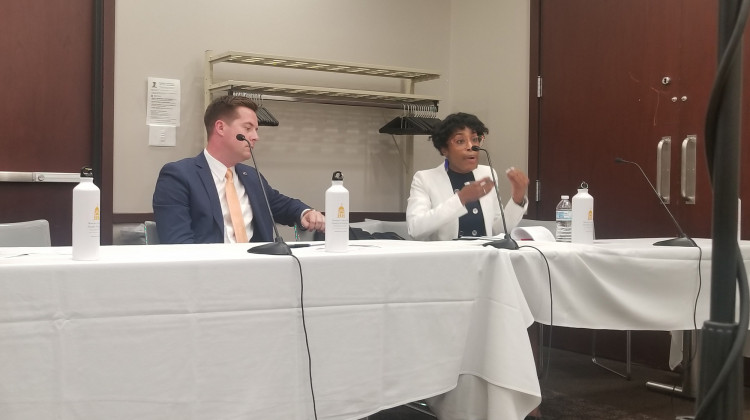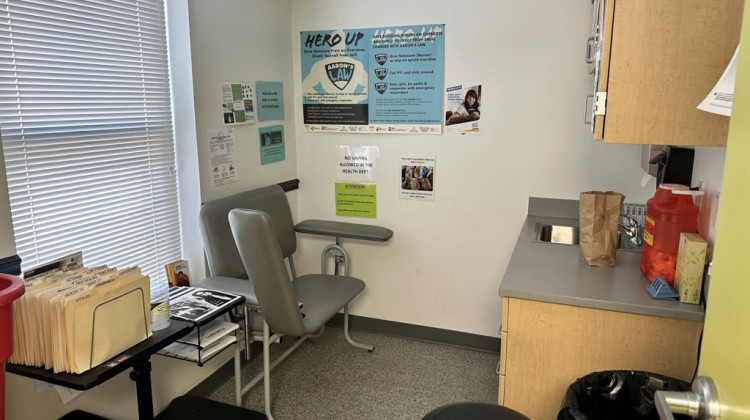
Indiana's Addiction Workforce panelists Douglas Hunstinger and Alexandra Duncan answer questions and comments from the audience.
Samantha Horton/IPB NewsAn increasing number of places in Indiana lack a suitable number of health providers. The research was presented at a day-long summit Tuesday discussing Indiana’s health workforce.
The Bowen Center for Health Workforce Research and Policy is working to help identify so-called Health Professional Shortage Area designations and break down the needs of the state into rural and urban populations. The study examines three health care areas – primary, mental and dental – and the access Hoosiers have to each of those. Out of the data, one of those health care areas is a problem almost everywhere in Indiana.
“There is a shortage of psychiatrists throughout Indiana,” Bowen Center research analyst Sierra Vaughn. “Right now we have roughly 400 psychiatrists to serve the entire state and most of them are located in metropolitan areas. So a lot of rural areas are underserved.”
And for those without nearby health providers, it could be costly.
“The greatest cost is that patients will either need to travel long distances to reach providers or they will either not have access to providers altogether,” she says. “So, our job is to make sure that there are providers in those areas who can actually serve them.”
To change that trend, there are some initiatives in place to help in the recruitment and retention of health care providers in areas of need.
“Those could range from loan repayment to a Center for Medicaid and Medicare services reimbursement program where providers actually receive 10 percent of the Medicare claims back,” says Bowen Center data technician Lacy Foy.
Vaughn says that the financial incentives can help, but the problem does not appear to be going away.
“The good and bad thing is that there are more designations in Indiana, which means that more providers can receive funding and resources to recruit and retain providers, but at the same time we are seeing increased designations for underserved areas,” Vaughn says.
Another panel at the summit Tuesday looked at the state’s addiction workforce. The conversation revealed Indiana is beginning to understand the depth of its drug crisis, but its response still lags.
“Indiana did not historically use Medicaid reimbursement, allow Medicaid reimbursement for addiction treatment,” says Indiana Community Mental Health Center President Matt Brooks. “As a result of that, we simply didn’t build the infrastructure required to support addiction treatment in Indiana.”
Attendees, including Brooks, say they also worry Medicaid patients aren’t given enough time to seek adequate treatment. The other concern Brooks has is the lack of a addiction counseling workforce in Indiana.
“Individuals didn’t pursue degrees in activities in license addiction counseling because there simply weren’t going to be jobs to support their activities,” Brooks says. “So it’s been a challenge and we are moving in a good direction.”
Still, Pew Research Center senior officer Alexandra Duncan says the state is improving its addiction counseling and Hepatitis C training.
“That really spoke to Indiana being a little more aware of what’s going on in its own state,” Duncan says
Duncan’s team is working on a comprehensive study of how Indiana is handling opioid addiction, in hopes of providing recommendations.
That study is scheduled to be complete this summer.
 DONATE
DONATE









 Support WFYI. We can't do it without you.
Support WFYI. We can't do it without you.